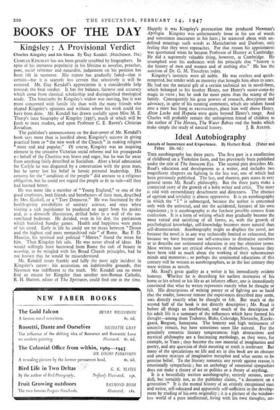BOOKS OF THE DAY
Kingsley : A Provisional Verdict
Charles Kingsley and his Ideas. By 'buy Kendall. (Hutchinson. 21S.) CHARLES KINGSLEY has not been greatly troubled by biographers. In spite of his immense popularity in his lifetime as novelist, preacher, poet, social reformer and naturalist, judgement on his position has been left in suspense. His repute has gradually faded—that is certain—but it is scarcely less certain that selectively it will be restored. Mr. Guy Kendall's appreciation is a considerable help towards the final verdict. It has the balance, fairness and accuracy which come from classical scholarship and distinguished theological study. The biography by Kingsley's widow was moving, but it was more concerned with family life than with the many friends who shaped Kingsley's opinions and without whom his work could not have been done. Mr. Kendall has drawn usefully upon Miss M. E. Thorp's later biography of Kingsley (1937), much of which will be fresh to most readers, and upon Professor C. E. Raven's Christian Socialism.
The publisher's announcement on the dust-cover of Mr. Kendall's book says more than is justified about Kingsley's success in giving practical form to "the new work of the Church" in making religion
more real and popular." Of course, Kingsley was an inspiring element in the tentative Victorian social reforms and his propaganda on behalf of the Chartists was brave and eager, but he was far away from anything fairly described as Socialism. After a brief admiration for Carlyle he was disgusted by a conversation with the great man, but he never lost his belief in heroic personal leadership. His concern for the "condition of the people" did amount to a religious obligation, but he could not regard the people as fit to rule—till they had learned better.
He was more like a member of "Young England," or one of the good employers, both friends and benefactors of their men, described by Mrs. Gaskell, or a "Tory Democrat." He was fascinated by the health-giving possibilities of sanitary science, and once when visiting a sick parishioner he produced an auger from his pocket and, as a domestfc illustration, drilled holes in a wall of the un- ventilated bedroom. He derided, even in his day, the puritanism which banished Sunday games. Health and happiness were parts of his creed. Early in life he could see no mean between "Deism and the highest and most monarchised rule-" of Rome. But F. D. Maurice, his spiritual and political "Master," found the mean for him. Then Kingsley felt safe. He was never afraid of ideas. He would willingly have borrowed from Rome the cult of beauty in worship, to be mingled with his Broad Church principles, had he not, known that he would be misunderstood.
Mr. Kendall treats frankly and fully the most ugly incident in Kingsley's career : his accusation, on indefensible grounds, that Newman was indifferent to the truth. Mr. Kendall can no more find an excuse for Kingsley than another non-Roman Catholic, R. H. Hutton, editor of The Spectator, could find one at the time. Happily it was Kingsley's provocation that produced Newman's Apologia. Kingsley was unfortunately loose in his use of words and sometimes inaccurate in his facts ; he scattered about with un- defined meanings sudi words as Manichaeism and Dualism, only feeling that they were reproaches. For that reason his appointment was questioned when he became Professor of History at Cambridge. He did a supremely valuable thing, however, at Cambridge. ' He triumphed over his audiences with his principle that "history is the history of men and women and of nothing else." . He has- the sanction of Dr. G. M. Trevelyan today.
Kingsley's instincts were all noble. He was restless and quick- tempered, but tender with an intensity that brought him often to tears. He had not the natural gift of a certain technical art in novel-form, which belonged to his brother Henry, nor Henry's easier-conierby magic in verse ; but he took far more pains than the scamp of the family. Consequently his great powers of research, description and advocacy, in spite of his running comments, which are seldom fused into a story but hang as excrescences, place him well above Henry. Alton Locke and Hypatia were quite beyond Henry's range. And Charles will probably remain the unforgotten friend of children as the author of The Heroes, The Water Babies and the books which make simple the study of natural history. J. B. ATKINS.


































 Previous page
Previous page